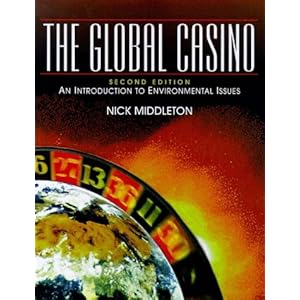Cap-and-trade will have no impact on the US economy, a new report by the Energy Information Administration concluded yesterday. Chalk it up in the “yet another study shows no downside to reducing carbon pollution” column: it's yet another blow to the free market alarmists whose tarot card prophesies of economic doom continue to be proven so consistently wrong.
Ok, so the EIA didn’t say “zero” impact, but it might as well have. According to the brand new, authoritative analysis, the Senate climate bill would reduce US GDP by only a CUMULATIVE $452 billion between 2013 and 2035, or 0.2%.
Now $452 billion sounds like a big number, but it’s in fact infinitesimally small. How infinitesimal? Over 23 years, that’s roughly $19.7 billion per year. That’s less money than is currently possessed by 18 individuals. In fact, the richest 17 people in the world could pay off the whole $452 billion and still be billionaires.
Hardly the picture of economic doom painted by the free market alarmists.
Of course, as anyone familiar with climate policy knows, it’s not just the “most likely scenario” that matters: worst-case scenarios, though unlikely, can still happen, so it’s important to consider those as well. But again, the data here will leave the fossil fuel pharisees disappointed. In 5 of the 6 scenarios, economic costs ranged from 0.1% to 0.4% of GDP, and the worst case scenario predicts a puny 1% GDP loss. Over 23 years, that’s 0.04% per year. That’s what the free market alarmists are so worked up about?
In other words, while there may be economic costs associated with making polluters pay, those costs are a fraction of tiny, and more importantly they are predictable. In general, we know pretty well what happens when, for example, we tax a good. To the extent that some uncertainty remains, the range of possibilities is finite and manageable--a 0.04% decline in GDP may sting, but we can live with it. And that doesn’t even include the benefits of action, which are likely to be orders of magnitude higher than the cost.
On the other hand, the range of possible outcomes from human interference with the climate is unpredictable and varies widely, and the worst-case scenarios are the stuff of nightmares. The consequences of messing with markets are a lot more manageable than those of messing with Nature.
Moreover, historical evidence suggests that whenever we’ve been wrong in predicting the cost of environmental regulations, we’ve nearly always overestimated the downside. Why? Because markets work: if government policy increases the price of energy, smart businesses will invent new technologies that reduce the cost of compliance and spawn entire new industries. In other words, if you think cap-and-trade will hurt the economy, it can only be because you don’t believe in markets.
On the other hand, if we’re wrong about the consequences of climate change, we’re likely underestimating them. With each new positive feedback that’s discovered, it becomes more and more likely that catastrophic climate change is in the cards for continued fossil fuel burning. In fact, a study found that “New scientific findings are found to be more than twenty times as likely to indicate that global climate disruption is ‘worse than previously expected,’ rather than "not as bad as previously expected.” Now, you can either read this as evidence that the dangers of global warming are becoming more clear as we learn more, or that the majority of the world’s scientists are engaged in a massive conspiracy to cover up the truth and establish an eco-communist new world order. But you’re a reasonable person. And do reasonable people believe in conspiracy theories about Nazi scientists?
So there you have it. The risks of pricing carbon are tiny, likely overblown (even as small as they are), and no matter how big will always fall within the manageable realm of human experience. On the other hand, climate risks are huge, likely dangerously underestimated, and could destroy civilization as we know it if the worst-case comes true. The decision is SO EASY.
And that’s the most heart-stoppingly infuriating, rip-your-hair-out mind-numbing, part about the whole “climate debate”: that the skeptics are willing to risk so much for so little, to bet the future of civilization--OUR civilization--on something so infinitesimally unimportant and devoid of value. Even if the skeptics are right, even if the scientists are wrong and there is absolutely zero reason to reduce CO2 emissions, the costs of doing so are so low that there's no harm in trying. Following the advice of a climate skeptic is like playing Russian Roulette for a quarter, like making a $1 million investment for a $100 return, like giving Barry Zito a $126 million contract. The fact that people with such warped notions of risk-reward think of themselves as stewards of our nation’s businesses is almost as terrifying as their influence on our climate policy. We don't want to do anything about CO2, because we might lose 0.04% of annual GDP.
When the worst case scenario for cap-and-trade is 0.04% of GDP per year, you need to be 99.96% certain that 97% of the world’s climate scientists are 100% wrong in their study of the climate. You’re a reasonable person. Care to take that bet?
RELATED POSTS
Climate craps: uncertainty and global warming
Visualizing the costs of cap-and-trade
5 weeks ago






Well put!
ReplyDeleteThanks! Feel free to share the link :)
ReplyDeleteI shot it through on twitter and have let others know about it :)
ReplyDeleteEnjoyed reading the article above, really explains everything in detail, the article is very interesting and effective. Thank you and good luck for the upcoming articles. Check this out
ReplyDeleteHACCP Certification in Mumbai
Enjoyed reading the article above, really explains everything in detail, the article is very interesting and effective. Thank you and good luck for the upcoming articles. Check this out
ReplyDeleteHACCP Certification in Sri Lanka
This comment has been removed by the author.
ReplyDelete